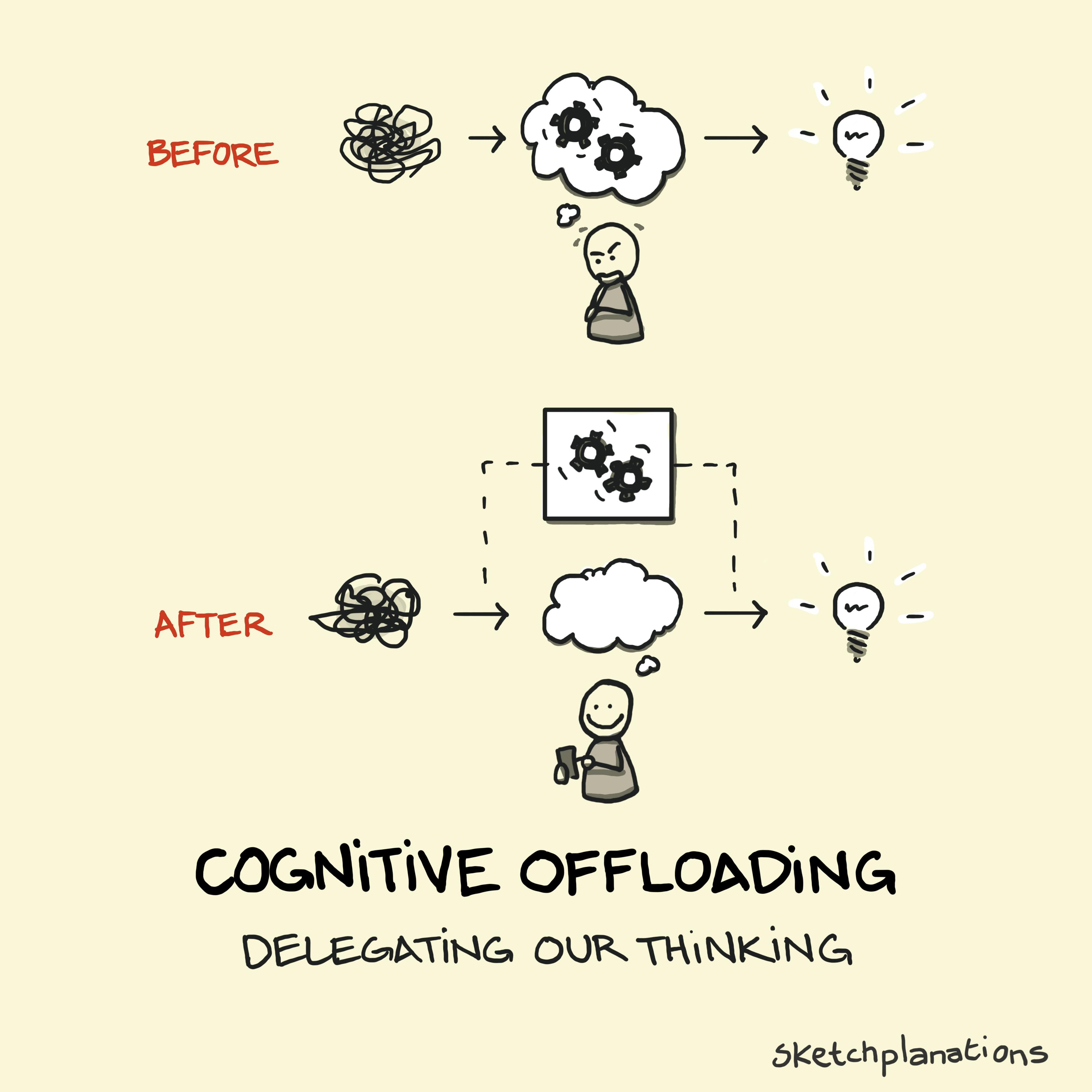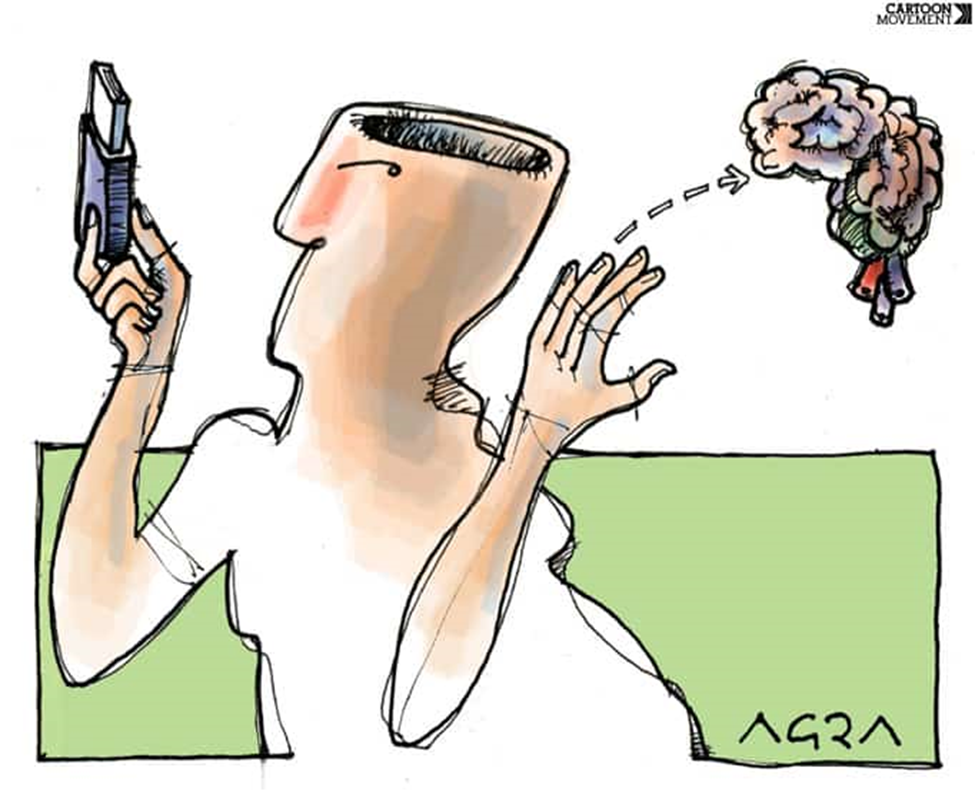Introduction
Picture this: you’re heading out the door, juggling coffee, keys, and the eternal question—“Did I turn off the stove?” Instead of trusting your brain, you quickly snap a photo of the stove. Crisis averted. Welcome to cognitive offloading, the habit of using external tools to help our brains manage life. From sticky notes and phone reminders to AI assistants, we’re constantly outsourcing memory and decision-making.

Far from being “lazy,” this strategy shows how flexible—and sometimes sneaky—our minds are. But here’s the million-dollar question: is this clever trick making us smarter, or is it slowly eroding our critical thinking skills?
Read More: AI and Empathy
What Exactly Is Cognitive Offloading?
Cognitive offloading is the practice of reducing mental effort by using external tools or actions—whether that’s writing a list, setting a calendar alert, or asking Siri to remind you to call Mom (Peng, 2025). Essentially, it’s outsourcing part of your working memory.
Psychologists describe this as a value-based decision: people weigh the cost of holding something in memory against the ease of outsourcing it (Gilbert, 2024). If the mental cost is high and a tool is handy, most of us will happily hit the “offload” button.
Think of it as your brain hiring a temporary intern to handle routine tasks.
Why Our Brains Love Shortcuts
Humans are what psychologists call cognitive misers (Fiske & Taylor, 1984). Our brains naturally prefer shortcuts, conserving energy wherever possible. After all, mental effort is costly—it burns glucose, tires us out, and can lead to errors.
That’s why it feels so good to write something down or let your phone buzz a reminder. It’s a clever hack: outsource the boring stuff so your brain can focus on creative, adaptive tasks.
When Offloading Helps
There are undeniable upsides to cognitive offloading:
- Efficiency: Freeing your brain from juggling details allows more bandwidth for higher-level thinking.
- Error reduction: Writing down instructions or setting a GPS reduces costly mistakes.
- Stress reduction: Offloading routine tasks lowers cognitive load, making people feel calmer and more in control.
A simple example: pilots and surgeons use checklists, not because they can’t remember, but because externalizing information prevents dangerous errors.

When Offloading Hurts
But there’s a catch. Cognitive offloading can make us too dependent on external tools. Research shows that when people rely heavily on reminders, they remember less overall (Fröscher, 2022). In other words, the more you lean on your phone for memory, the less you actually train your internal memory muscles.
This can create what some researchers call the “Google effect”: people stop storing information because they know it’s always just a search away. Convenient? Yes. Risky? Also yes.
The Rise of AI
Enter the era of artificial intelligence. Studies suggest that relying on AI systems for memory, planning, and even reasoning increases offloading dramatically—and not always in good ways.
A 2025 mixed-method study of 666 participants found that frequent AI use was negatively correlated with critical thinking ability. The researchers concluded that cognitive offloading mediated this relationship: the more participants leaned on AI, the less they engaged their own reflective thought (Sandstrom et al., 2025).
This isn’t to say AI is “bad.” Rather, it’s a reminder that if we let AI do all the thinking, our critical faculties may atrophy—just like muscles unused in the gym.
What If You Couldn’t Offload?
Imagine waking up tomorrow and discovering that all calendars, reminders, and note-taking apps have vanished. You’d need to memorize meetings, birthdays, shopping lists, and passwords—all at once. The likely outcome? Stress, missed obligations, and cognitive overload.
This highlights the paradox: cognitive offloading is not a weakness, but an adaptation. It keeps us functional in a complex, information-heavy world.
Balanced Offloading
So how do we keep the benefits without the downsides? Researchers suggest a balanced approach:
- Offload routine details (appointments, chores, reminders).
- Retain meaningful challenges (problem-solving, deep learning, critical thinking).
- Use tech as a scaffold, not a substitute. For example, write notes by hand first, then store them digitally—combining internal and external memory.
Fröscher (2022) even found that framing reminders differently changes behavior. When people were reminded of the potential losses of over-reliance, they were more likely to strike a healthy balance.
Real-World Stories of Offloading
- The Post-it Professional: A manager who covers her office in colorful sticky notes doesn’t have a poor memory—she’s externalizing to focus her mental energy on decision-making.
- The GPS Addict: Someone who can’t drive across town without Google Maps has perfectly functioning memory, but constant offloading weakens their internal sense of spatial navigation.
- The AI Student: A college student relying on ChatGPT for brainstorming may generate more essays—but risks dulling their own analytical creativity.
Human + Tech Symbiosis
The future of cognitive offloading lies not in abandoning it, but in designing smarter tools. Imagine:
- A calendar that occasionally asks you to recall an event before showing it.
- A note-taking app that prompts reflection: “Can you summarize this in your own words?”
- AI that nudges users to think critically instead of delivering ready-made answers.
This way, offloading doesn’t just replace thinking—it enhances it.
Conclusion
Cognitive offloading is neither friend nor foe—it’s both. It reflects our brain’s brilliant efficiency, freeing us from cognitive overload. But left unchecked, it can dull our memory and weaken critical thinking.
The trick is balance: let technology hold the grocery list, but don’t let it hold your ability to reason. Think of cognitive offloading as a brain buddy, not a brain boss. Keep flexing those neural muscles, and let external aids be your sidekick—not your superhero.
References
Fiske, S. T., & Taylor, S. E. (1984). Social cognition. Addison-Wesley.
Fröscher, L. (2022). Framing cognitive offloading in terms of gains or losses: Effects on reminder setting and memory performance. Cognitive Research: Principles and Implications, 7(63), 1–12. https://doi.org/10.1186/s41235-022-00416-3
Gilbert, S. J. (2024). Modelling cognitive effort and the expected value of memory in decisions to offload. Cognition, 241, 105656. https://doi.org/10.1016/j.cognition.2023.105656
Peng, J. L. (2025). Cognitive offloading and its role in human–computer interaction. International Journal of Human–Computer Interaction, 41(2), 123–137. https://doi.org/10.1080/10447318.2025.2474449
Sandstrom, R., Ali, K., & Nguyen, T. (2025). AI tools in society: Impacts on cognitive offloading and critical thinking. Societies, 15(1), 6. https://doi.org/10.3390/soc15010006
Subscribe to PsychUniverse
Get the latest updates and insights.
Join 3,030 other subscribers!
Niwlikar, B. A. (2025, September 4). Cognitive Offloading and 3 Important Ways It Benefits Us. PsychUniverse. https://psychuniverse.com/cognitive-offloading/



